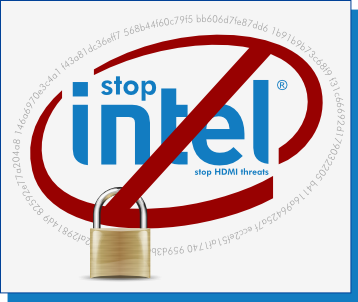Once again, we're seeing boneheaded reactions to the failure of a DRM scheme. DRM is largely ineffective against large-scale unauthorized copying going on in Eastern Europe and Asia, and yet the large media companies are happy to parade the opposite as the truth. Instead of admitting their real goal of disrupting legitimate uses and restricting customers as much as possible — forcing them to repeatedly purchase the same records, movies and TV shows again and again — they pretend that this is technological progress.

As you may have heard in the news, Intel is now threatening legal action against people using the recently discovered master key for HDMI.
HDMI — the High-Definition Multimedia Interface — is a type of connector used by high-definition televisions, Blu-ray players and video game consoles to communicate. HDMI includes a rights-restriction scheme, HDCP. Last week, the master key for HDCP was finally discovered, giving users the ability to remove the restrictions on their HD videos.
Intel, the developers of HDCP, are presumably under a great deal of pressure from the media companies who thought HDCP was going to be their savior DRM scheme for the next 10 years. Let's be clear though — large scale copiers have been making copies of Blu-ray disks for some time now — this is known to the media companies, just like it was with DVD, and like DVD and their attempts to suppress copies of DeCSS — this master key will be of little significance to these factories churning out unauthorized copies of disks.
- Effective measure at stopping unauthorized copying? No.
- Obvious attempt to restrict legitimate uses and control individuals? Yes.
Processor gamble
If that wasn't enough: Intel is also launching a new mechanism for processor upgrades — a mechanism that involves scratch tickets.
For the low-low fee of just $50, you too can be the lucky owner of an Intel scratch ticket and upgrade your processor to its full capabilities in an instant. This is the same kind of mess Microsoft tried to do with Windows NT 4 and is doing again with Windows 7 — we call this an antifeature.
Why would anyone want to buy a computer that can do much more than it's capable of (see iPhone, iPad, etc) — only to have the speed and new features of your processor locked away? Intel is hoping you will, but we think this, and their threats over HDCP, will persuade you otherwise.
Take action against Intel's mess:
Don't buy Intel processors.
Send an email to Intel CEO Paul Otellini — paul.s.otellini@intel.com — and let him know that you won't be buying any more of their processors. Don't forget to CC or BCC us at info@defectivebydesign.org on your email
Put this warning button your webspace, blog or favorite social site, to let people know what Intel is up to.
Don't buy media restricted with schemes like HDCP.
Spread the word by sharing this page on your social networking sites.